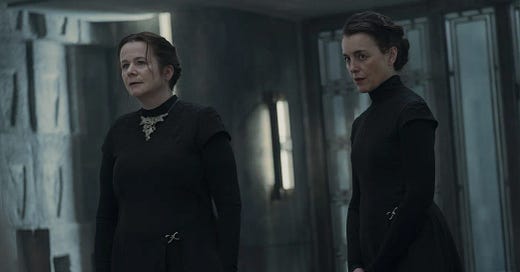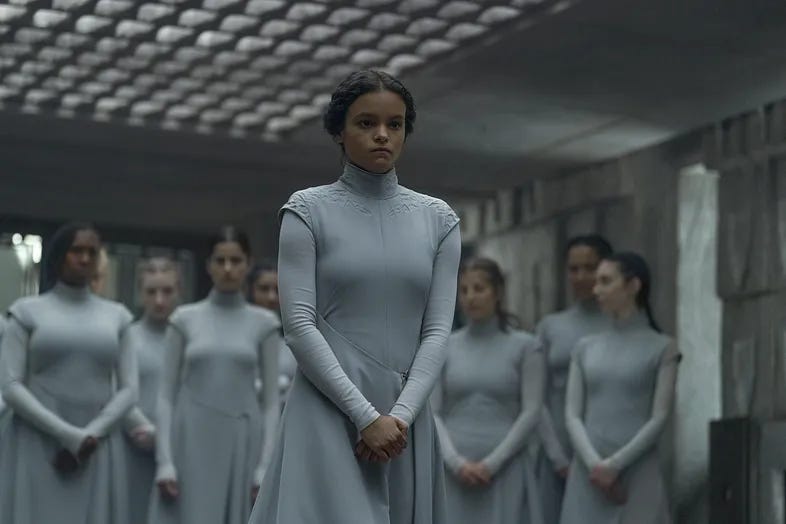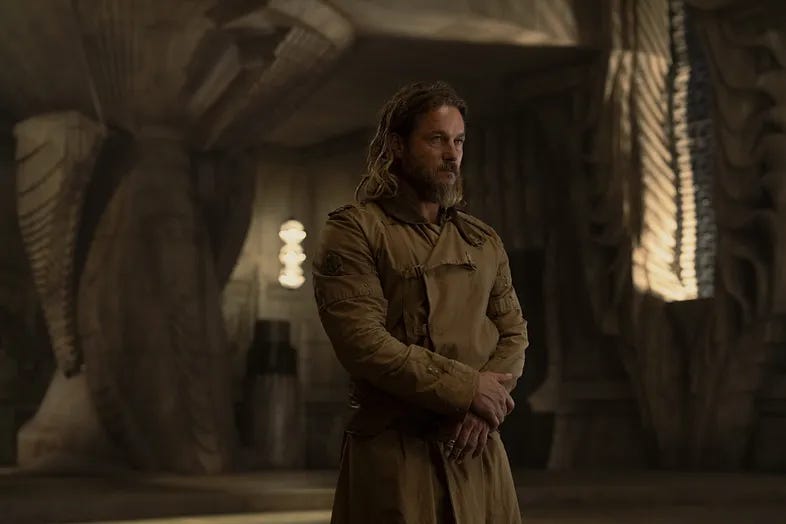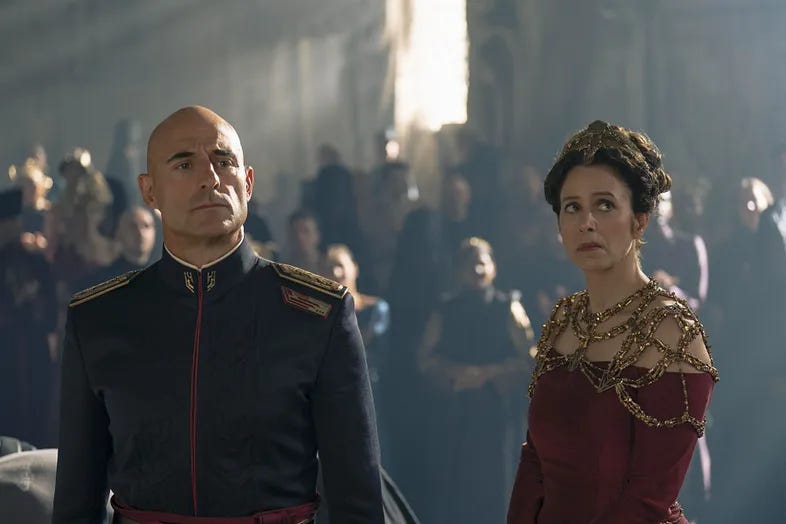Exploring Dune: Prophecy with the Creators and Cast
A journey through the power, pain, evolution and mystique of the Bene Gesserit.
Dune: Prophecy, the tense and epic series adaptation of Dune: Sisterhood by Brian Herbert and Kevin J. Anderson, has arrived, expanding Frank Herbert’s universe even further. As a massive fan of Denis Villeneuve’s adaptations, I eagerly awaited this series, which shares much of films’ striking visual DNA. So when the invitation arrived to join a press conference with the series’ creators and cast, I knew I couldn’t pass it up.
The press conference brought together key figures from the production: showrunner and executive producer Alison Schapker, executive producer Jordan Goldberg, and a stellar lineup of cast members, consisting of Emily Watson (Mother Superior Valya Harkonnen), Olivia Williams (Reverend Mother Tula Harkonnen), Travis Fimmel (Desmond Hart), Jodhi May (Empress Natalya Arat Corrino), Sarah-Sofie Boussnina (Princess Ynez Corrino), Josh Heuston (Constance Corrino), Chris Mason (Keiran Atreides), Chloe Lea (Sister Lila), and Jade Anouka (Sister Theodosia). Together, they explored the depth of this prequel, set over 10,000 years before Paul Atreides’ journey, and discussed how the show explores the origins of the Bene Gesserit sisterhood and the many layers of political intrigue, power struggles, and the pursuit of human potential.
Here are some of the highlights from the press conference.
The Ambition Behind Dune: Prophecy
Alison Schapker, the showrunner, explained her approach to adapting and expanding on the original works, striking a balance between Herbert’s lore and new narratives. “We’re interested in Valya Harkonnen’s whole lifetime,” she noted, explaining how the show jumps between timelines. “One timeline tethers us to the books closely, while the other allows us to create.” This approach — a mix of canon and invention — gives the series its foundation while exploring fresh perspectives on Dune’s timeless themes of power, control, and survival.
By shifting the focus between the past and present, Schapker and her team could better explore how history and legacy affect Dune’s characters. It’s not just a question of filling in the background; it’s about how these histories live on in each choice and challenge — an echo of Dune’s long-held motifs about the endurance of the past within the present.
The Power and Pain of the Bene Gesserit
Central to Dune: Prophecy is Valya Harkonnen, portrayed with fierce intensity by Emily Watson. Valya’s journey reveals the Bene Gesserit’s layered, often brutal philosophy. “There’s a moment when Valya’s heart froze,” Watson shared, hinting at a traumatic past. “Everything she does is fueled by rage and vengeance.” For Watson, this is what drives Valya’s character — a dangerous mixture of pain and purpose.
Where the Bene Gesserit sisterhood is often seen as calculating and calm, Valya’s rawness brings a stark unpredictability to the narrative. This angle not only adds depth to her character but also underlines one of the series’ core messages: that even those rigorously trained for total control can be haunted by the ghosts of their past.
Valya’s younger sister, Tula, played by Olivia Williams, brings a quieter power to the sisterhood. “When your older sister occupies the ‘sound and fury’ position, you internalize rage,” Williams said, calling Tula “a science nerd who finds quiet, efficient ways to eliminate her enemies.” Tula’s calm contrasts with Valya’s intensity, showcasing the diverse strengths within the Bene Gesserit, each woman finding her way through a world driven by secrecy, power, and survival.
Humanity and Manipulation
Dune has always pondered the nature of humanity, especially in a universe scarred by technological advances and existential threats. Executive producer Jordan Goldberg spoke to this, saying “In Dune, you’re dealing with heroes who can become villains and vice versa…humans now control their destinies, but fear and uncertainty drive a desire to control everything, creating conflict.” This interplay of freedom and oppression sits at the heart of Dune: Prophecy, where characters wrestle with morality in their quest for order.
Alison Schapker further explained that the Bene Gesserit represents humanity’s push to overcome its limits. Their motto, “Crisis, Survival, Advancement,” is both their philosophy and driving force, prompting them to shape not only individuals but entire societies. “We think of the Bene Gesserit as an organization pushing the boundaries of human evolution,” she said. In Dune: Prophecy, this ambition is shown in the sisterhood’s disciplined training, political reach, and genetic engineering — all tools to guide humanity into the Bene Gesserit’s vision of the future.
A World Shaped by Myth and History
Dune’s aesthetic has always borrowed from ancient mythologies and medieval themes, and Dune: Prophecy leans heavily into this heritage. Alison Schapker described the show as “modern mythology cloaked in old-world power dynamics.” These influences are shown in how the Bene Gesserit interacts with noble houses — as advisors, spies, and silent forces behind the throne.
Emily Watson and Olivia Williams drew from historical figures for their roles. “We went to the National Portrait Gallery to study Elizabeth I, Mary Queen of Scots…women who balanced power, truth, and manipulation in a police state,” Watson shared. These historical themes add layers of authenticity to Dune: Prophecy, where echoes of past power struggles reveal these women’s quiet yet potent influence behind both scenes and thrones. The Bene Gesserit’s hidden influence becomes a commentary on the timeless theme of the strength and danger of concealed authority.
The Prophet Speaks
A new and complex figure in Dune: Prophecy is Desmond Hart, a survivor of Arrakis, played by Travis Fimmel. Arriving in the Emperor’s court as a prophetic figure, Fimmel’s Desmond embodies a tormented conscience. “Desmond has a moral compass, but he’s fueled by anger and heartbreak,” Fimmel described, his character finding twisted justice in his internal struggles.
Desmond’s presence unsettles the Imperial court, and Empress Natalya, played by Jodhi May, views him as a threat to her husband’s power. “Their marriage was built on love, but now she feels estranged, watching him lean on this Rasputin-like figure,” May explained. Desmond’s influence introduces a strong tension that foreshadows power struggles among the Emperor, the Bene Gesserit, and the noble houses, each vying for dominance over the Known Universe.
Expanding the Dune Universe
With a layered cast and expansive storytelling, Dune: Prophecy explores deeper into the past of Frank Herbert’s Dune universe. The series moves its focus from the vast desert landscapes of the original books to the shadowed halls of noble palaces, underscoring Dune’s contrasts: power and fragility, freedom and control, life and survival. This world draws us in, feeling at once ancient and futuristic, blending past and future into one immersive vision. No wonder why the Dune universe has been the primary focus of so many science fiction franches coming after it.
The creative team behind Dune: Prophecy has clearly committed to a vision that respects Herbert’s world while daring to explore new ground. “Dune is vividly realized, visceral, specific, deep, and provocative,” Schapker reflected. “It imagines a future where technology is banned and humans ask, ‘What does it mean to be human?’” Dune: Prophecy may offer answers to this question, ones that resonate beyond even its own universe.
The Gates, Wide Open
With its rich characters, ambitious storytelling, and intricate themes, Dune: Prophecy aims to be much more than a simple science fiction prequel to Denis Villeneuve’s epic films. It invites us to explore the timeless ideas that have kept Dune relevant for decades, challenging viewers to rethink concepts of power, identity, and human potential. For those looking for science fiction that goes beyond spectacle, Dune: Prophecy promises a thoughtful journey into the forces shaping both individuals and empires, opening the gates wide to the worlds of Frank Herbert’s imagination.
This article is based on the transcript of a press conference held by HBO in New York City on October 31st, 2024.







